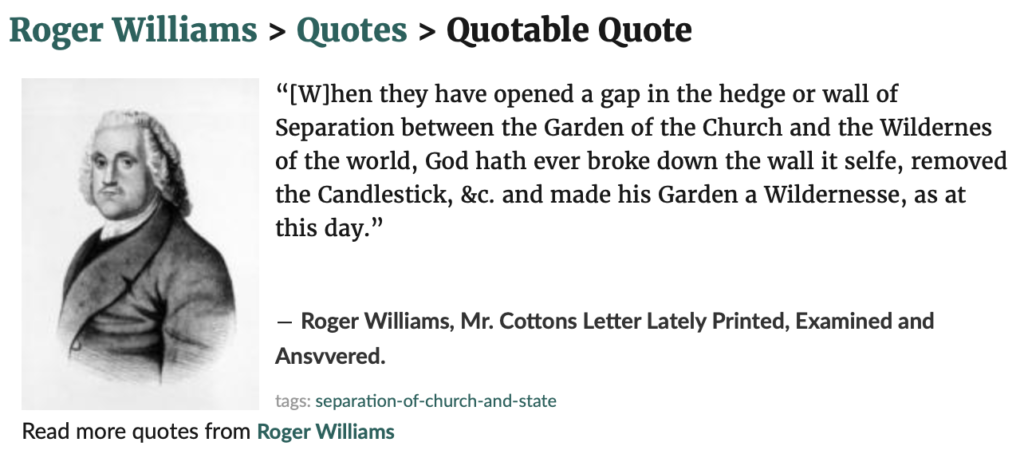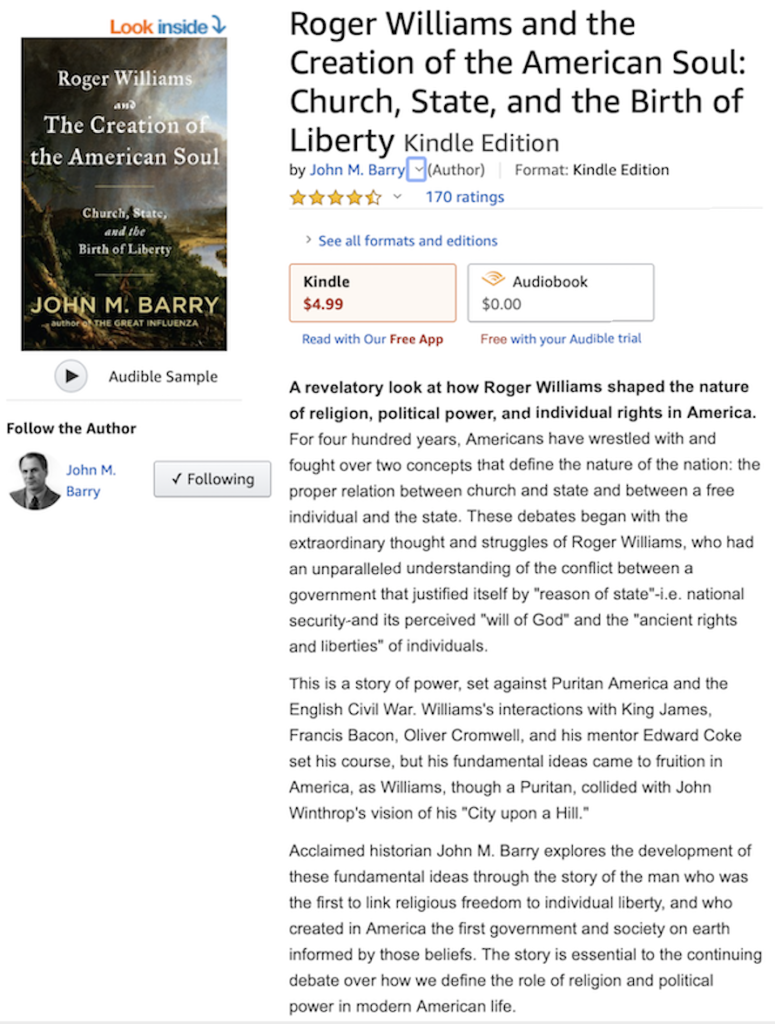I don’t have any evidence that Roger Williams ever had influenza, and, as far as I know, the only connection between the virus and Pastor Williams is that historian, John M. Barry, has written about both.
Mr. Barry is a historian to read, not for pleasure, but for education. I read The Great Influenza, a 2004 book which I expected to be the story of the 1918 virus, but which covered the development of medical technology for much of the 20th century and proposed strategies for dealing with future pandemics such as Covid 19. It’s a great book, and I recommend it. But don’t try to hurry through it.
Based on that experience, I then read Roger Williams and the Creation of the American Soul, a 2012 book which told me as much about the settlement and settlers and indigenous people of New England and the Old England 17th century chaos which motivated so many to leave the old for the new as it did about the life of Roger Williams. I guess I should have expected that from the full title of the book. Every page was interesting but also tiring, and twenty or so tended to put me to sleep. Read it anyway. Context is vitally important.
I think the reason these two Barry books are not quick reads is that he tends to wander off on rabbit trails yielding deeper digs into and better understanding of context than one might expect. The first couple of sentences in the Afterword of the Williams book explain that wandering tendency of the author’s mind:
“This book was supposed to be about the home front in World War I, culminating in the events of 1919, the most tumultuous peacetime year in American history. My plan was to use several major figures as narrative vehicles to explore the enormous changes then occurring in the country. One of those figures was Billy Sunday, the first evangelist to visit big cities, the model for Sinclair Lewis’s Elmer Gantry, and a man who did not hesitate to inject himself into politics.”
And that starting point, home front in WWI, strangely led to a detailed history of 17th century conflicting visions of the new world, Puritan John Winthrop’s theocracy and Puritan Roger Williams’s dream of complete liberty of conscience with no government interest in any violation of the first four of the Ten Commandments and with complete separation of church and state, no civil penalties for violation of any church rules and regulations. And the Afterword is the only place in the book that the name Billy Sunday shows up.
Among many quotations included in the book, Williams wrote this which is easier to copy from goodreads.com than to type:

Barry’s understanding of the simple meaning of that “olde English” is that, “when one mixes religion and politics one gets politics.”
It is a sad picture painted of the Britain of Williams’s century, constant conflict among loyalists of the Church of England, Puritans, Catholics, Presbyterians, and Quakers, ranging from mutual disgust and/or fear to persecution and punishment as extreme as hanging, drawing, and quartering, in the name of the state, for faith offenses, in a time when the head of state was also the head of the church and the head of state may be Church of England in one decade and Catholic in the next.
But, understanding the reasons for mass emigration to the new world, Williams also recognized that a society built on government interpretation and enforcement of God’s laws, “could at best lead only to hypocrisy,” and he believed that forced worship, “stinks in God’s nostrils.” Certainly the Christian theology would affirm that any motive for worship and good works other than pure love of God and neighbor would have an unpleasant odor.
Roman Emperor Constantine gets a lot of credit for stopping the official persecution of Christians, but I’m not sure Emperor Theodosius gets enough blame for making it the official state religion just a few decades later and beginning persecution of other religions. I’m not judging any particular person but suspect that move resulted in a lot of “forced worship” and “hypocrisy.”
The ideas put forth by Williams are worth contemplation even in the 21st Century when much of the world still lacks freedom of religion and when some in the USA would like to establish all Ten Commandments, not just the ones against stealing, killing, and bearing false witness, as common law. Good luck on coming up with enforceable definitions of and appropriate punishments for such violations as coveting goods and wives and dishonoring parents, let alone failing to love God. And, thank God, we are all free to vote consistently with our religious faith.
I have both books on Kindle and plan to keep them there in case I need to look something up. Below is a screen shot of the Amazon page on this book. Only $4.99 on Kindle!
